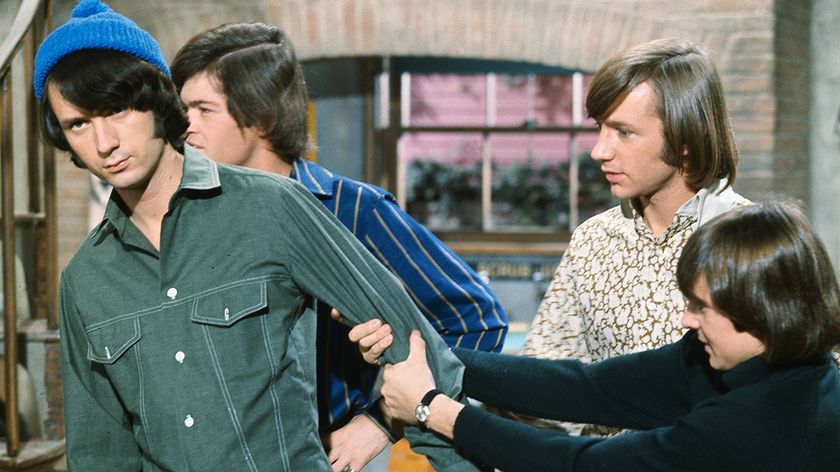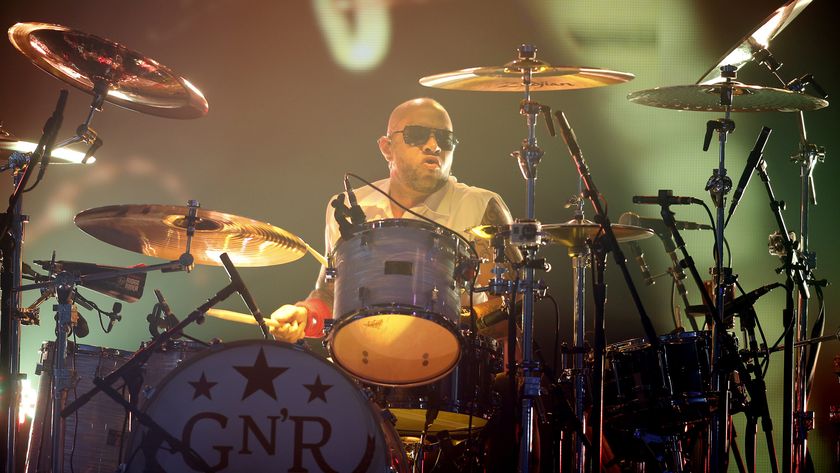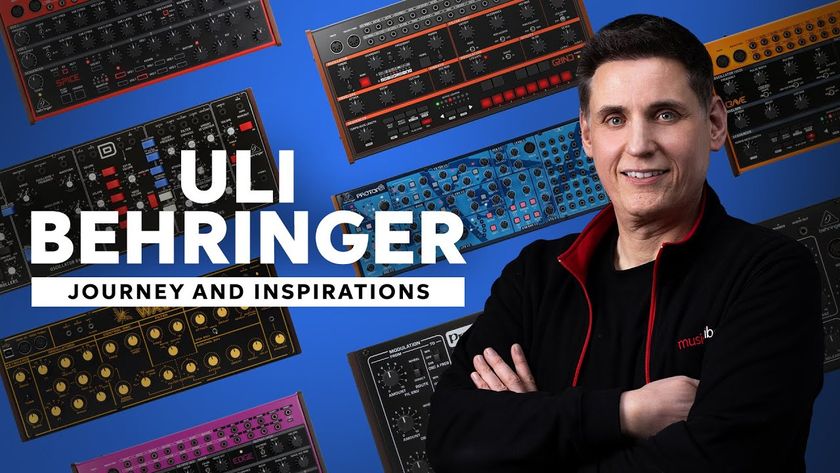Jonathan Ullman’s secrets for drum session success
Boston drummer shares his top tips

All you need to know for session stardom
You’ll often find that in big music cities like London and LA there’s only a limited number of gigs for the drumming elite, and precious little for aspiring sessioneers trying to catch a break.
But what if we told you there could be an untapped supply of session work right on your doorstep? That’s exactly what Boston drummer Jonathan Ulman discovered following his decision to step away from the local band scene and its associated politics.
Ulman began by contacting local producers, singer-songwriters and bands to let them know he was available for hire. Word spread, the diary started filling and a few years later he is one of Boston’s premier studio and live drummers, with a reputation for his likeable personality, killer drum sound and ability to work under pressure - essential tools for any aspiring session drummer.
Understand what makes you unique versus just another player out there doing the same thing
Ulman’s drumming journey began at the age of 10, playing along to his older brother’s hip-hop records. “I was effectively learning how to be in the pocket right from the beginning,” he says of the style that forms the foundation of his groovy playing style. But killer chops and perfect time are only part of the winning formula.
It’s doubtful we would have heard the name ‘Jonathan Ulman’ here had it not been for the skills he picked up during his marketing and communications degree, and photography and digital media masters. Jonathan is a first-rate marketeer and his hard work, both on and off the drum kit, was rewarded at the 2016 Boston Music Awards where he was crowned Session Musician Of The Year.
Jonathan’s story is unique, and with so many drummers looking to break into session work we were keen to unpick how a relative unknown musicians was able to develop a successful career in his own backyard. Keep reading to learn the secrets behind his success.
1. Be your own biggest fan
“Not in an egotistical way, but realise that being confident in your own product is going to give your client confidence in you. Understand what makes you unique versus just another player out there doing the same thing. Whether it’s a style, a look, an idea, bringing something different to the table not only helps make you more memorable to others, it will set you apart.”
2. Market yourself
“Understanding the consumer and the marketplace both locally and on a national level is important. When marketing, promoting and networking it’s about finding a balance between being overly pushy and just being thoughtfully persistent. This is essential to building relationships and maintaining them.”
3. Master the hurdle
“I spent the majority of the first three years [as a professional] taking any and all gigs, paid or unpaid. The more that people know what you do the better. I would make lists of who I could entice or who I could bring my name to. I got involved in studio situations right off the bat.
“I knew a lot of producers because I’d worked with them doing my own records. Not all bands have a drummer who can work quickly in the studio, can work with a click track. When money’s on the table and you want to get your record done, six songs a day over a weekend, it’s easier to pay somebody to come in and do it quickly and not have any drama associated with it.”

Marketing, gear deals and more
4. Plant seeds everywhere
“You can’t just be this guy that’ll play on a record, or this guy that’s available for shows. You have to plant seeds in multiple areas and nurture them and let them grow on their own. I go to studios and tell them what I do, that I’ve worked with these engineers; all of a sudden I’m on their radar.”
5. Never underestimate word of mouth
“[Word of mouth] is the single most effective and vital way of bringing in more work and maintaining it. Try to work with as many people as possible but also build and grow relationships with a core group of people who can help get you more repeat gigs.
"Find a means to bring something to the table that benefits them, and in turn hopefully their recommendations of you as a player will grow organically. If a studio session goes well with an artist, take the opportunity to mention that you are available to play live with them in support of their record.”
6. Earn your endorsements
"It’s a very small industry. You can’t send a blanket email to Pearl, Tama, Ludwig, Sonor and say, ‘Hey I’ve been using your products my whole life.’ They’re gonna talk.
"When I was [exploring endorsements] I already had all my equipment and I’d been using it for years. I wasn’t looking for free products. My conversation with them was, ‘I really would love to be a part of your family, here’s what I’m doing. I’m not looking to get endorsements with other companies, but I’d like to start the conversation with you.’
"I had three or four conversations with Zildjian [Jonathan also uses Ludwig, Evans, Vic Firth and Protection Racket] and I still have all my rejection letters from them. I would say, ‘Here’s where I am,’ and they would say they weren’t interested.
"I made a note in my calendar to contact them in another six months, but also to do something different in that period – add more shows, play with higher-visibility artists. I did that for three or four years until one day they liked what I was doing enough to start the relationship together.”
7. Fill up on T.A.P.A.S
“The original meaning of tapas is ‘a wide variety of plates to create a complete cuisine’, but I think of it as a wide variety of characteristics and skills that create a total and complete package as a player.
"‘T’ means ‘thorough’, paying close attention to every detail, being methodical and meticulous; ‘A’ means ‘adaptable’, being able to adjust to all situations whether on stage, in the studio or on the road; ‘P’ stands for ‘professional’. Be worthy of the high standards of this profession and exceed expectations in all areas. ‘A’ means ‘Attentive’, paying close attention, being alert, being an attentive listener, and to detail on all levels; and ‘S’ stands for ‘skilled’, having the knowledge and ability to perform on all levels in all genres.
"This is what I think makes a great session player successful.”
8. The devil is in the detail
“I went into a session about a month ago in which the artist wanted a snare sound that was just like this band The Sonics. They sent me songs with the sounds they were looking for.
"The engineer and me got four other producers and engineers to listen to these songs and tried to work out how we could get this snare sound both from a miking perspective and what snare to actually use. We ended up using a 64 Ludwig Down Beat.
"I went into a session with five days of research, five producers and engineers all trying to find this snare sound, and we got it pretty close. That kind of attention to detail is what they’re going to take to other people the next time they recommend you.”

The importance of social media...and beards
9. Break the ice
“Any time I come into the studio and I’m meeting people for the first time, before we do anything I take 10 minutes to talk about anything other than what we’re about to embark on.
"Let’s go into this with at least a minimal amount of information about each other so we can move forward with a little bit more chemistry. My personality is to keep it light.
"The overall goal is that they’re happy, they have their product, I have the opportunity to play on their record and it’s another piece for my resume.”
10. Social media is important, but don't rely on it
“The majority of my work comes from the groundwork that I lay for my career, rather than hoping that somebody is keeping up on the Facebook page. I’m still waiting for my lucky break where I can get that superstar artist to call me.
"I never assume the social media thing is how I’m going to make it. I think it’s going to be my hard work and that one artist who’s going to say my name to somebody in their circle.”
11. Nail your image (grow a beard)
“In order to market yourself you have to be able to set yourself apart in some way shape or form, or become memorable, visibly, sonically and personality-wise.
"It all goes into a much grander plan – if people know this face they can recall it or it becomes memorable to them, then it’s another means of staying relevant in people’s minds.
"For me it’s just one more thing that helps people remember my name. That’s what marketing is; a great slogan, a great look.”
12. Practice makes perfect
“I’ve kind of established where I am as an artist. If you’re hiring me it’s because you like my sound, my style of playing.
"What I tend to practise is getting more confident and working in and around the click, refining my sound as a drummer.
"A successful drummer is when people know that person’s sound. I want that Jonathan Ulman drum sound. That’s where I spend a lot of my time.”
13. Take care of business
“Being able to control all aspects of your career financially is important, especially once you become your own entity. [In terms of pricing] I never want to let a gig or a session pass me by because I’m not getting my rate.
"I’m selective, but if I want to play on your record we’ll figure it out. I can do a lot of side, corporate stuff that tends to pay really well and then I can take the gigs that I want. I try to load up on studio work because that’s where the money is.
“Most artists going into a studio know that they’ve got to pay the studio and know they’ve got to pay the artists who are playing on [the recording].
"If I can sell them that we can get your record done in one or two days, rather than having to find a drummer on Craigslist, teach them, pay for a rehearsal space; there’s time and money saved right there.”
14. Establish your go-to gear
“I have cymbals I’ll bring to every live gig and most studio sessions. I bring a 22", 16", 12" Ludwig Classic Maple. It records well, it sounds great live.
"For cymbals I tend to stick with the K Dark stuff. They’re warm, nice in different environments and with different sizes can fluctuate in brightness. I know how well they work in all environments. I keep a bag of cymbals and a drumset aside that’s my go-to for pretty much everything.
"I’ve been using a Black Beauty snare drum for the last 15 years. That’s pretty much been on everything I’ve done. There are weapons of choice that make you feel comfortable.
"When you hit a cymbal you’re not shocked by anything. There are some things that you just play and nothing is distracting on it. You need to put the things in place that are your security blankets.”

I'm MusicRadar's eCommerce Editor. In addition to testing the latest music gear, with a particular focus on electronic drums, it's my job to manage the 300+ buyer's guides on MusicRadar and help musicians find the right gear for them at the best prices. I dabble with guitar, but my main instrument is the drums, which I have been playing for 24 years. I've been a part of the music gear industry for 20 years, including 7 years as Editor of the UK's best-selling drum magazine Rhythm, and 5 years as a freelance music writer, during which time I worked with the world's biggest instrument brands including Roland, Boss, Laney and Natal.

"They said, ‘Thank you, but no thank you - it’s not a Monkees song.’ He said, ‘Wait a minute, I am one of the Monkees! What are you talking about?’": Micky Dolenz explains Mike Nesmith's "frustration" at being in The Monkees

“There’s nights where I think, ‘If we don’t get to Paradise City soon I’m going to pass out!’”: How drummer Frank Ferrer powered Guns N’ Roses for 19 years

"They said, ‘Thank you, but no thank you - it’s not a Monkees song.’ He said, ‘Wait a minute, I am one of the Monkees! What are you talking about?’": Micky Dolenz explains Mike Nesmith's "frustration" at being in The Monkees

“There’s nights where I think, ‘If we don’t get to Paradise City soon I’m going to pass out!’”: How drummer Frank Ferrer powered Guns N’ Roses for 19 years


![Chris Hayes [left] wears a purple checked shirt and plays his 1957 Stratocaster in the studio; Michael J. Fox tears it up onstage as Marty McFly in the 1985 blockbuster Back To The Future.](https://cdn.mos.cms.futurecdn.net/nWZUSbFAwA6EqQdruLmXXh-840-80.jpg)






